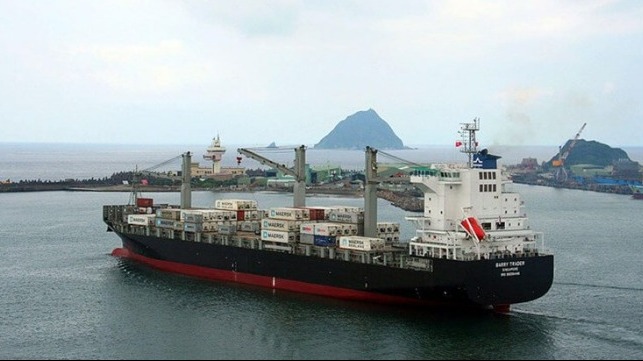CO2 Capture System Using Limestone to Begin Trial on Lomar Vessel

Tests are starting next month aboard one of Lomar’s ships for a novel approach to shipboard carbon capture that is being presented as a simpler method to apply and handle as well as offering a cost-effective method to capture CO2 aboard existing, in-service vessels. Developed by a two-year-old UK startup the technology has attracted the support of Lomar, Eastern Pacific Shipping, a broad range of investors, and the UK government through its clean maritime solutions accelerator program.
Seabound, a London-based climate tech startup reports since its founding in 2021 it has built two working land-based prototypes of its concept which uses a patent-pending compact carbon capture device that can be retrofitted to a ship’s funnel. The CO2 in the exhaust chemically reacts with pebbles of quicklime, which then convert into limestone, keeping the CO2 locked in. The pebbles are safe, inert, and non-toxic. Seabound reports that quicklime is abundantly available worldwide and reasonably priced.
Unlike many of the concepts for CO2 capture, the system does not work by trapping and liquefying the gas which presents challenges for the storage and handling aboard a ship. The limestone pebbles would be temporarily stored onboard before the ship returns to port, without any need for energy-intensive CO2 separation, compression, or liquefaction. Once back in port, the limestone pebbles are offloaded and either sold in pure form or turned back into quicklime and CO2, for the quicklime to be reused onboard another vessel and the CO2 sold for utilization or sequestration.
Preparations to install the equipment onboard the first ship will take place in May and June this year. The first-ever pilot project is scheduled to run throughout this summer aboard one of Lomar’s vessels. Seabound reports it has already secured seven letters of intent from leading shipowners even before the vessel trials begin. Based on their research, they expect to be able to capture up to 95 percent of CO2 from exhaust.
The trial is also the first project to be supported by Lomar’s newly launched Lomarlabs, a venture lab that will act as a catalyst in the development of new technologies to address the challenges facing the maritime industry. Lomar highlights that one of the biggest challenges maritime technology companies face is access to vessels and shipyards to test and refine their concepts. The new venture lab can provide the access to infrastructure through Lomar and its parent company Libra Group as well as expertise and experience to aid in the development of these new technologies.

that matters most
Get the latest maritime news delivered to your inbox daily.
“Lomarlabs is advising on engineering and design for this transformative solution, adapting it to the realities of everyday commercial shipping operations,” said Stylianos Papageorgiou, the former Lomar Technical Director who has been appointed Managing Director for Lomarlabs. “We will help formulate pilot tests on Lomar vessels, and fine-tune the business model using our industry insight to help make a viable business. We share our experience and network to develop solutions that have the potential of delivering systematic change for our maritime industry.”
Seabound was among the projects selected in September 2022 by the UK’s Clear Maritime Demonstration Competition Round 3 funded by the UK Department for Transport and delivered in partnership with Innovate UK. The third round allocated £60m to 19 flagship projects supported by 92 UK organizations to deliver real-world demonstration R&D projects in clean maritime solutions.
